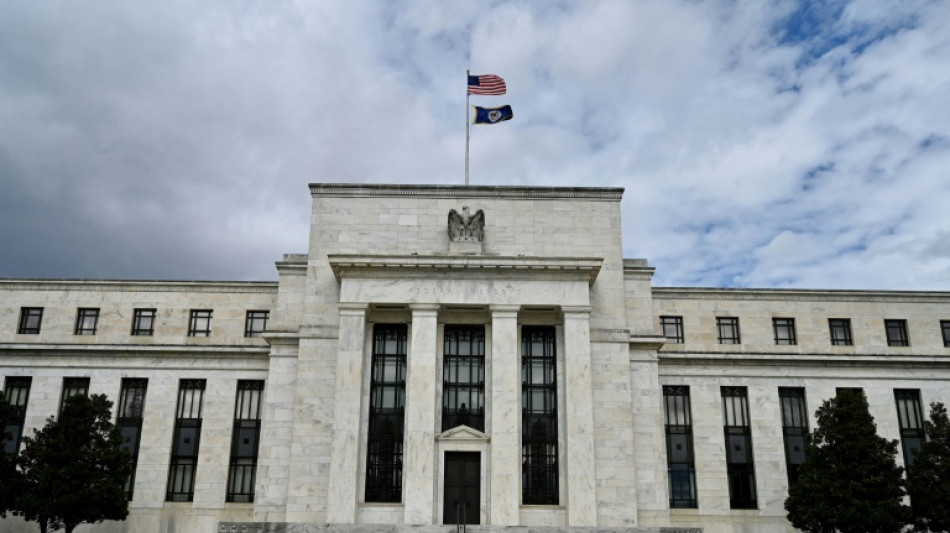
Asia tracks Wall St losses as Fed prepares to tighten screws

Asian equity markets fell Thursday after minutes from the Federal Reserve's latest policy meeting indicated it is preparing to aggressively wind back its monetary policy, while oil prices bounced back from another big drop.
The eagerly awaited summary dealt another blow to traders, who have grown increasingly concerned that officials will not be able to rein in 40-year-high inflation while also preventing the world's top economy from tipping into recession.
According to the minutes, several policymakers were in favour of lifting interest rates half a percentage point while they also talked about offloading their bond holdings at a rate of $95 million per month -- a process known as quantitative tightening.
The Fed's balance sheet runs to about $9 trillion.
News that such measures were being considered comes after several members of the policy board made hawkish comments about lifting rates. The next meeting takes place May 3-4.
The prospect of borrowing costs rising at a quicker pace and to a higher level over the coming months has added to a wave of uncertainty across trading floors caused by the war in Ukraine.
And while data at the moment points to a healthy economy, commentators warn of possible hard times ahead.
"This job of orchestrating a soft landing (for the economy) is going to be difficult," Tracie McMillion, at Wells Fargo Investment Institute, told Bloomberg Television.
"We've only seen quantitative tightening once before and it was to a lesser degree than it will be this time, and it ended shortly after it started."
Wall Street tumbled for the second day in a row, with the Nasdaq again losing more than two percent, as tech firms are more susceptible to higher rates.
And Asia broadly followed suit, with Tokyo, Sydney, Seoul, Taipei, Singapore, Wellington and Manila all down.
Hong Kong and Shanghai fluctuated on hopes that China will move to ease monetary policy as its giant economy struggles under the weight of lockdowns in various parts of the country.
Authorities will step in to use tools at an "appropriate time", according to the readout of a State Council meeting chaired by Premier Li Keqiang, adding they would also look at other ways to increase consumption.
On oil markets, both main contracts enjoyed healthy gains a day after tanking more than five percent on concerns about demand caused by a possible economic slowdown.
The commodity had also been hit by an announcement from the International Energy Agency that it will release tens of millions of barrels to offset those lost through sanctions on Russia over its invasion of Ukraine.
And Stephen Innes of SPI Asset Management said: "China's Omicron outbreak is spreading much faster than previous virus strains, and authorities, not ready to switch to a different strategy, are still trying to contain outbreaks by implementing strict controls.
"In light of that, oil traders continue to downgrade their mainland demand forecasts."
- Key figures around 0230 GMT -
Tokyo - Nikkei 225: DOWN 2.0 percent at 26,803.34 (break)
Hong Kong - Hang Seng Index: DOWN 0.1 percent at 22,065.84
Shanghai - Composite: DOWN 0.3 percent at 3,272.12
Brent North Sea crude: UP 1.9 percent at $102.94 per barrel
West Texas Intermediate: UP 1.8percent at $97.94 per barrel
Euro/dollar: UP at $1.0910 from $1.0900 late Wednesday
Pound/dollar: UP at $1.3081 from $1.3071
Euro/pound: UP at 83.41 pence from 83.38 pence
Dollar/yen: DOWN at 123.63 yen from 123.79 yen
New York - Dow: DOWN 0.4 percent at 34,496.51 (close)
London - FTSE 100: DOWN 0.3 percent at 7,587.70 (close)
(Y.Yildiz--BBZ)

 London
London

 Manchester
Manchester
 Glasgow
Glasgow
 Dublin
Dublin
 Belfast
Belfast
 Washington
Washington
 Denver
Denver
 Atlanta
Atlanta
 Dallas
Dallas
 Houston Texas
Houston Texas
 New Orleans
New Orleans
 El Paso
El Paso
 Phoenix
Phoenix
 Los Angeles
Los Angeles



